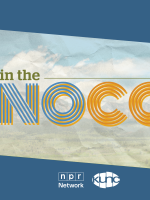In the late 1960s, a new movement of Black music grew out of the end of the civil rights era. Black artists declared their “Black power” and rocked the airwaves with the sound of funk.
Funk music was more than just a genre with excellent grooves. It had deeper social and political meaning. Funk began as a and would ultimately lay the foundation for the hip0hop and R&B we listen to today.
This is the argument in the , called The Funk Movement: Music, Culture, and Politics.
Rabaka is a professor of African, African American, and Caribbean studies at the University of Colorado Boulder. He is also the founder and director of the at CU, and hosts a podcast called .
He joined Erin O'Toole to talk about the importance of funk, and why it deserves respect for its singular impact on music and culture.








